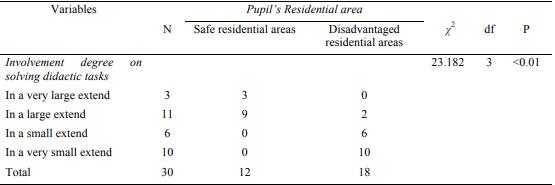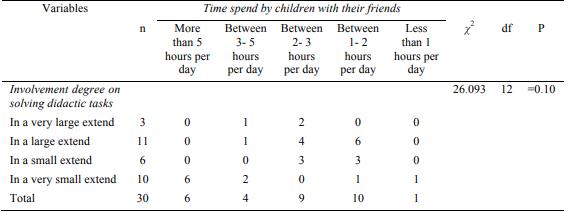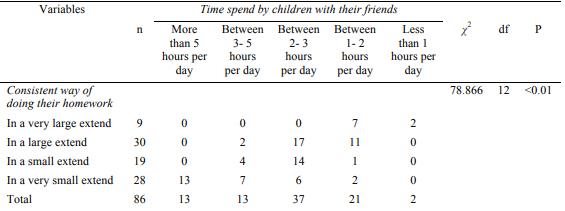Abstract
Out of the numerous factors that influence the behaviour of children in the scholar environment, that is the hereditary factors, the psycho- social traits of the family, their social status, school management, we shall focus on this study on the impact the social environment of origin of these children has on the degree of school task performance and on their behaviour related to their didactic activities. The environment where the entire family lives represents the universe in which the child can find and make friends, or play fellows, the universe where they learn various social behaviours, by enculturation in some cases..
Keywords: Sources of school resultsprimary educationscholar activitiessocial environment of origin
1.Introduction
The environment where the entire family lives represents the universe in which the child can find and
make friends, or play fellows, the universe where they learn various social behaviours, by enculturation in
some cases. As a consequence, the social behaviours of the elderly, with whom the children interact,
leave as well, to a great extent, their mark on later development of some positive or negative attitudes the
child has towards school, which may lead to educational task performance or to their elusion.
2.Paper Theoretical Foundation and Related Literature
The cultural climate of the family influences the student's academic performance, particularly by:
the aspiration of parents, their attitude towards school and education, the cultural baggage itself (language
use, cultural practices) and value system promoted by parents. Thus, the socio-cultural level of the family
determines to a large extent: the child's attitude toward school, and taste for culture, wealth and accuracy
of language, the aspirations of the child (which is usually directly proportional to the parents’),
motivational level, and the material conditions necessary for the assimilation of the culture. (Tăușan,
2012)
Family background is the key to student’s life outside of school, is the most important influence on
student learning and includes factors such as socioeconomic status, two-parents versus single-parents
household, parenting practices and aspirations, family size and neighbourhood (Majoribanks, 1996).
Studies shows that supportive and attentive parenting practices positively affect academic achievement
(Eamon, 2005), and high parent aspirations have been associated with increasing students’ interest in
education (Majoribanks, 1996) and it should be taken into consideration when designing the complex
learning situation students will be involved in school (Soare, 2015).
The findings from a study conducted by Yuping Zhang (2011)can be summarized into two main
points: first, net of objective measures of children’s family socioeconomic status and achievement at
school, teachers’ perceptions of the importance of children's home environment are closely associated
with teachers’ evaluations of children’s academic competence and behaviour in school; furthermore,
teachers’ perceptions of home importance are closely associated with teachers’ educational expectations,
both directly, and indirectly through teachers’ evaluations of children. Second, teachers’ expectations of
children’s future school attainment at an early point in time are significant predictors of children’s later
school persistence.
The family environment influences the students’ individual adaptation, especially their self-
esteem, adaptation and optimism, influences academic achievement and success in school more than the
schools’ environment (Szőcs, 2013). Family activities such as parents attending school activities, spending
time talking with their children, going on vacations and participating in fun activities may increase
schools test scores (Barry, 2006). Regarding the benefits identified by parents in term of education upon
the impact and the consequences that technology can have on children personality development, parents
placed on top: the speed of accessing information and communication in the electronic environment, the
development of mental abilities and the last was building and developing the skills for the use of PC and
leisure function. (Tudor, 2015)
The influence of the familial socio-cultural status extends to the leisure time and has
repercussions, indirectly, on school achievement. Children from disadvantaged families spend their free
time on spontaneous activities and functional games which develop physical and motor skills, preparing
them, to some extent, for life, but which do not favour intellectual maturity. Conversely, children from
higher social classes benefit from activities that stimulate intellectual and perceptual skills and have an
extensive experience with both the physical world and the social issues. Their psychic energy is
channelled into constructive activities that favour school acquisitions.
Besides the predominant influence of the familial socio-cultural status which is widely recognized,
there is also a considerable influence of economic conditions on the child’s schooling. Within vulnerable
environments, parents are often concerned about material problems, sometimes serious, and cannot be to
their children’s disposal. The lack of affective relationship strengthens cultural effects of family poverty.
Moreover, housing and overcrowding are likely to cause some tensions and disrupt the family
atmosphere. And, finally, quantitative and / or qualitative chronic malnutrition, insufficient sleep or
disrupted by bad material conditions are harmful to the psychological balance of the child’s physical
development and, consequently, to his schooling.
Parents’ education level and the family income level have a lower impact on the school
performances of small age pupils. Langa (2012) underlines once more the necessity to establish a more
solid partnership between school and family to make easier the pupils’ way to school success.
Pointing the importance the environment has in the process of developing pupils’ social behaviour,
Ezechil (2015) underlines the necessity of a reform targeting – on the one hand - to restructure the
content of pupils’ behaviour in the classroom and also - on the other hand -to restructure the content of
the relation teacher-pupil, pupil-pupil and the relation of the pupil with himself.
3.Methodology
2.1. The purpose of the study
The analysis of the socioeconomic environment factors upon school activities of small age pupils.
The following issues will be taken into account: the involvement degree on solving didactic tasks, the
children’s behaviours during scholar activities, homework.
2.2. The research hypotheses of this study
1. There are significant differences among children who come from different residential areas as
regardsthe involvement degree on solving didactic tasks.
2. There are significant differences between childrenleft to spend their spare time with their peers and
those having a stable program to spend with their friends, as regards the involvement degree on solving
didactic tasks.
3. There are significant differences among children who come from different residential areas as
regards a consistent way of doing their homework.
4. There are significant differences between childrenleft to spend their spare time with the elderly and
those having a stable program to spend with their friends, as regards a consistent way of doing their
homework.
2.3 Description of the Instrument
The method used in this investigative approach was the questionnaire-based investigation. The
questionnaires were applied using an online platform and face to face sessions. The questionnaires for
teachers were structured based on the following dimensions:
�obtainment of information as to the number of pupils in the classroom, the education level and
the income level of the children’s parents;
�the results obtained by pupils, their behavior during the school activities,consistent way of doing
their homework.
�the factual data – socio-professional status, education seniority, the environment of the education
unit they activate in.
The questionnaires for parents were structured based on the following dimensions:
�establish a rigorous program of work and play for children;
�monitore the time spent with friends;
�homework supervision.
�the factual data – socio-professional status, education seniority, income level, rezidential area.
2.4. Target group
The methodology used in this investigative approach is the questionnaire applied on a group of 25
primary education teachers in the urban environment and 86 parents of the pupils.
4.Findings and Results
The first hypothesis “There are significant differences among children who come from different
residential areas as regardsthe involvement degree on solving didactic tasks”was tested through
tasks in the school environment depend on the children’s residential areas [χ2 (3) = 23.182, p <0.01].
According to the teachers included in the investigation, the residence of students is an important factor in
terms of their attitude towards school activities. Students from disadvantaged residential areas tend to be
less involved in solving school tasks and need to be constantly stimulated by teachers. Children who live
in a safe environment are more involved in school duties in that they are more willing to answer teachers’
questions and are more attentive to instructions needed to perform various school tasks.

According to the results obtained (table 3) through the application of the Person
verification of the second hypothesis, there are no significant differences between the pupils that spend
time with their friends as regards involvement degree on solving didactic tasks [
In the teachers’ opinion, the time children spend with their friends has not a decisive influence on their
involvement and performance of school tasks.

The third hypothesis “There are significant differences among children who come from different residential areas as regards a consistent way of doing their homework” was tested through Person
According to the results obtained (table 4), there are significant differences between the parents who live
in different residential areas as regards a consistent way of doing their homework [
p<0.01]. Parents who come from disadvantaged backgrounds claim they cannot give more support to
their children to homework, because of material deprivation, inappropriate living space and the length of
time they have to spend at work to ensure an acceptable standard of living. On the other hand, parents
who live in safer residential areas, give more support to their children to homework and to fostering a
favourable attitude toward school.

Through Person
children left to spend their spare time with the elderly and those having a stable program to spend with
their friends, as regards a consistent way of doing their homework”. According to the results obtained
(table 5), there are significant differences between the parents who give full freedom to children in
deciding on the length of time they spend with their friends, and the parents who establish, for their
children, a program of spending time with peers as regardsthe consistent way of doing homework. [
(12) = 78.866, p<0.01]. At this particular age, the parents are those that can control the work and
relaxation time of their children. Children who spend more than 3 hours a day together with their friends
do not pay too much attention to a consistent way of doing their homework.

5.Discussions and Conclusions
As they grow up, from small schooling to preadolescence, adolescence, the social environment
becomes a second family, which will prepare children for their adult life. Student performance and
failures are largely conditioned by the real support of their parents and the influence of the domestic
socio-economic environment.
Each parent should try to answer the following questions: Have I given a few hours to correctly
and critically observe my child’s performance? How much time have I spent playing with my child? Have
I been able to step in with the first responsibilities? Have I managed to establish a balanced program of
work and play?
A parent who is constantly aware of its role and understands its mission, will know how to guide
the child on the path of knowledge, will know how to be a good partner in order to act simultaneously in
his/her efforts to support the child’s progress. We can speak of parents with higher education who have an
easy-going attitude towards their children’s performance, and also of families having a limited economic
level, a low level of instruction (secondary school or vocational school graduates) who want their children
to overcome their own condition.
The urban residential area of a family has a significant influence on the children’s school work.
Whichever side of town where they might be living, families are anchored in the nearby reality and
comply with the specific behavioural characteristics of the local population. Knowing the peers with
whom their small schoolchildren socialize represents a dream for any family, especially for those living in
deprived residential environments. Children spend their free time on social networks that can have
negative effects on their emotional and social development. Therefore, parents should know first what
kind information their child can access and, secondly, how much time and with whom their child
communicates.
The primary school teacher is the first person with epistemic authority, who recommends,
suggests, using clear and coherent arguments, auxiliary materials, books for the first library, educational
programs, and, therefore, the relationship between family and school is essential in correctly guiding the
child on the educational path.
References
- Barry, Jennifer, (2006), The effect of socio-economic status on academic achievement, Phd thesis,
- Wichita State University.
- Eamon, Mry, Keegan, (2005), Social-demographic, school, neighbourhood and parenting influences on academic achievement of Latino young adolescents. Journal of Youth and Adolescence, 34(2), 163-175.
- Ezechil, L, 2015, The Necessity of a Pedagogical Reform in the Pre-university Education in Romania, Procedia - Social and Behavioral Sciences 180 (2015), 559 – 564.
- Langa, C., (2012),Influence of the socio-economic environment of origin on the school results of the pupils in primary education. Scientific bulletin - education sciences series, IX (1), 43-55.
- Majoribanks, K. (1996), Family learning environments and students’ outcomes: a review. Journal of Comparative Family Studies, 27(2), 373-394.
- Soare, E. (2015), Using the complex learning situation model in the evaluation of competences. Procedia - Social and Behavioral Sciences, 180 1 – 6.
- Szőcs, Levente, (2013), The effects of the socioeconomic status on the academic achievement. Phd thesis, Cluj Napoca
- Tăușan, L. (2012). Optimization of School Adjustment by Strengthening the School-Family Educational
- Partnership. Journal Plus Education, 8(1), 32-39.
- Tudor, S.L. (2015), Perception of educational factors on the introduction of electronic learning tools in the context of the new curriculum for primary education. Procedia - Social and Behavioral Sciences 187 (2015) 454 – 458.
- Zhang, Yuping, (2011), Influence of Home Environment on Children’s Schooling: From Teacher’s Perspective. Gansu Survey of Children and Families Papers. 21.
Copyright information

This work is licensed under a Creative Commons Attribution-NonCommercial-NoDerivatives 4.0 International License.
About this article
Publication Date
25 May 2017
Article Doi
eBook ISBN
978-1-80296-022-8
Publisher
Future Academy
Volume
23
Print ISBN (optional)
-
Edition Number
1st Edition
Pages
1-2032
Subjects
Educational strategies, educational policy, organization of education, management of education, teacher, teacher training
Cite this article as:
Langa, C., & Langa, C. (2017). The Impact Of Social Environment On Scholar Activities Of Primary School’s Pupils. In E. Soare, & C. Langa (Eds.), Education Facing Contemporary World Issues, vol 23. European Proceedings of Social and Behavioural Sciences (pp. 7-14). Future Academy. https://doi.org/10.15405/epsbs.2017.05.02.2

